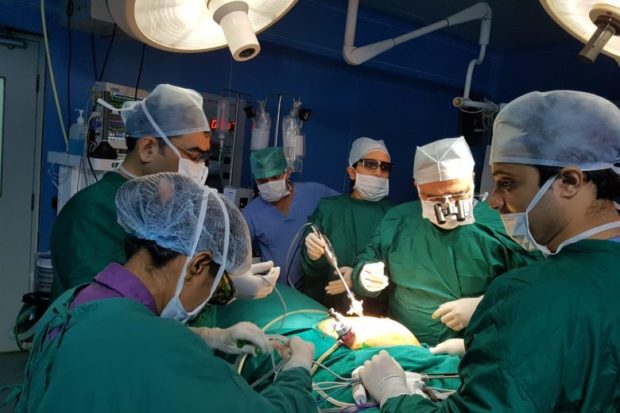Transplant organs in short supply in India during COVID-19 pandemic

As India began to unlock its economy in phases, organ donations have gradually restarted. DR SANJEEV JADHAV via The Straits Times/Asia News Network
BANGALORE — As September rolled in, Mr Kamlesh Gadage visited the hospital for the 10th time in eight months. The 36-year-old vegetable seller from Pune suffers from liver cirrhosis, and had registered for a liver transplant in December.
“I am fifth on the waiting list, but due to Covid, my wait is extending forever. I have a lot of pain and visit the hospital every 15 to 20 days,” Mr Gadage said.
The Covid-19 pandemic and the nationwide lockdown have stopped nearly all organ donations in India. Social distancing rules imposed on March 25, widespread fear of coronavirus infections, and a virtual suspension of non-Covid treatments in speciality hospitals have left thousands of patients in need of liver, kidney, lung, and heart transplants uncertain about their future.
Dr R. Kanthimathi, who heads the transplant authority in Tamil Nadu, the state with one of the largest numbers of organ donations in India, said: “Organ donations have fallen because of the reduced traffic accidents under the lockdown.”
Hearts and lungs are harvested from deceased donors, accident victims who become brain dead. Livers and kidneys come usually from live donors, often relatives.
Article continues after this advertisement“Doctors and intensivists have been overworked and stressed for months with Covid patients. Organ donations may not be their highest priority. There’s a shortage of ventilators and intensive care units too,” said Dr Aabha Nagral, Mr Gadage’s physician and trustee at Mumbai’s Children’s Liver Foundation.
Article continues after this advertisementDuring the pandemic, the number of organ donations has fallen globally. But compared to 49 organ donations per million in Spain and 36 per million in the US in 2019, and Singapore with 6.6 organ donations per million in 2017, India sees only 0.65 organ donations per million population.
Covid-19 has further skewed that ratio.
Tamil Nadu, for instance, had 15 heart, 17 lung, 34 liver, and 69 kidney transplants from January to March. Following the lockdown, the state did not see deceased donors until July, when restrictions were eased.
Physicians had to weigh the benefits of life-saving surgery with the risks of exposing already-fragile patients with heart or lung failure to the coronavirus.
“There is a high chance of transmission of infection from the donor, doctors, ward boys, ambulance drivers to the immune-compromised recipient, so there are medico-legal issues,” Dr Sanjeev Jadhav, director of heart and lung transplants at Mumbai’s Apollo Hospital, said.
As on Sept 8 in Tamil Nadu, there were 47 people waiting for a heart transplant, 27 for a lung transplant, 474 for a liver transplant and 5,789 for a kidney transplant. In Maharashtra, as on Aug 29, there were 74 on the heart waitlist, 16 for a lung transplant, 1,100 for a liver transplant and 5,500 for a kidney transplant.
From July, as India began to unlock its economy in phases, organ donations have gradually restarted. “The unfortunate reality is, it is because road accidents have started again too,” said Dr Kanthimathi.
Dr Sunil Shroff, founder of the Chennai-based Mohan Foundation that promotes organ donation, said: “Live donors are still few because people are afraid of hospitals. This means there are patients on the waiting list dying of heart or lung failure.”
To minimize the risk of infection, state governments have now devised standard operating procedures. Tamil Nadu tests the donor, the recipient, and also the recipient’s close family members, for Covid-19. In Maharashtra, patients and healthcare workers are screened for 28 days.
Meanwhile, a new group has entered the waiting list for lung and heart transplants: Covid survivors. On Aug 29, Chennai doctors performed a lung transplant on a 48-year-old Covid survivor, and on Sept 11, a Chandigarh hospital also transplanted lungs into a 32-year-old patient.
Dr Shroff worried about “a tsunami of Covid survivors” who will need transplants after their lungs “stiffen like bricks” affecting their breathing capacity.
But Dr Paul Ramesh, a cardiothoracic, heart and lung transplant surgeon at Chennai’s Apollo Hospital, suggested caution.
“The success of a lung transplant is measured through survival 30 days after surgery, then one-year survival. This is currently an unknown data point in Covid patients anywhere in the world,” he said.
For more news about the novel coronavirus click here.
What you need to know about Coronavirus.
For more information on COVID-19, call the DOH Hotline: (02) 86517800 local 1149/1150.
The Inquirer Foundation supports our healthcare frontliners and is still accepting cash donations to be deposited at Banco de Oro (BDO) current account #007960018860 or donate through PayMaya using this link.